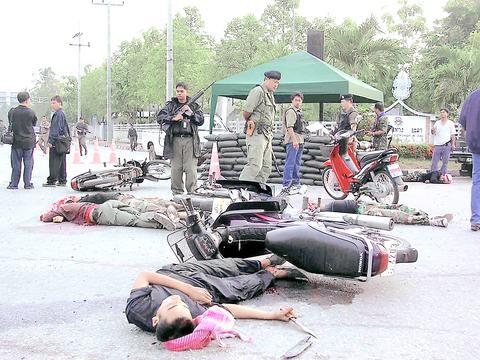Police gunned down scores of machete-wielding militants who stormed more than a dozen security outposts yesterday, the bloodiest day of fighting yet in Thailand's troubled Muslim-dominated south. The death toll stood at least 112.
Only five security personnel were among the dead. The rest were insurgents, mostly teenagers.
The eight hours of mayhem ended when police fired tear gas and rocket-propelled grenades into a mosque, killing 32 militants who witnesses said had been sheltering inside after running away from an earlier battle.

PHOTO: REUTERS
Television news reports showed the bodies of suspected Islamic fighters lying in pools of blood, some of them in front of police stations clasping machetes and wearing colored shirts and camouflage pants.
Gunfire echoed as armored personnel carriers cruised deserted village streets and commandos moved through the forest. Policemen and soldiers carrying automatic rifles crouched as they ran across roads and ditches.
No group claimed responsibility for the highly coordinated assault by possibly hundreds of young militants, although past violence has been blamed on separatists seeking to carve a homeland in the Muslim-majority south of this predominantly Buddhist country.
The death count was dramatically lopsided.
Army chief General Chaiyasith Shinawatra told reporters that 107 insurgent were killed and 17 were arrested. He said three policemen and two soldiers were also killed while 15 policemen were wounded.
Soldiers and police -- tipped off in advance -- were waiting for the poorly armed assailants. Some had guns but most carried only machetes, said Lieutenant General Proong Bunphandung, the chief of police for the south.
"The security officers have been patiently working with local people and gathering intelligence. We waited for the right time to achieve this success," he said.
Many parts of the region have been under martial law for months. Security was tightened yesterday along the border with Malaysia, which has in the past denied allegations of harboring militants.
The violence erupted at 5am when the insurgents attacked more than 15 police bases, village defense posts and district offices in Yala, Pattani and Songkhla provinces in a bid to steal weapons.
It was the worst bloodshed seen in the south where almost daily attacks by gunmen have left nearly 160 people dead this year, including yesterday's toll.
"Most of the dead insurgents are youths of ages ranging from 15 to 20, but two of the leaders are aged about 50 and 60," Proong said, adding that four of the militants were taken alive.
Prime Minister Thaksin Shinawatra said the raids were linked to a Jan. 4 attack on a military camp in nearby Narathiwat province, which triggered an upsurge of violence in the area this year. Four soldiers were killed and hundreds of guns stolen in that raid.
However, Thaksin denied the attackers had connections to international terrorists.
"Most of the insurgents are youths from the southern provinces," Thaksin said. "Their acts are not linked with international terrorists."
He said the attackers intended "to rob guns from defense volunteers and district offices, but our troops were well prepared for that."
"They arrived at the target point with brand new motorcycles. This proves they got financial support from influential figures, including politicians and drug gangsters," he said.

US President Donald Trump yesterday announced sweeping "reciprocal tariffs" on US trading partners, including a 32 percent tax on goods from Taiwan that is set to take effect on Wednesday. At a Rose Garden event, Trump declared a 10 percent baseline tax on imports from all countries, with the White House saying it would take effect on Saturday. Countries with larger trade surpluses with the US would face higher duties beginning on Wednesday, including Taiwan (32 percent), China (34 percent), Japan (24 percent), South Korea (25 percent), Vietnam (46 percent) and Thailand (36 percent). Canada and Mexico, the two largest US trading

AIR SUPPORT: The Ministry of National Defense thanked the US for the delivery, adding that it was an indicator of the White House’s commitment to the Taiwan Relations Act Deputy Minister of National Defense Po Horng-huei (柏鴻輝) and Representative to the US Alexander Yui on Friday attended a delivery ceremony for the first of Taiwan’s long-awaited 66 F-16C/D Block 70 jets at a Lockheed Martin Corp factory in Greenville, South Carolina. “We are so proud to be the global home of the F-16 and to support Taiwan’s air defense capabilities,” US Representative William Timmons wrote on X, alongside a photograph of Taiwanese and US officials at the event. The F-16C/D Block 70 jets Taiwan ordered have the same capabilities as aircraft that had been upgraded to F-16Vs. The batch of Lockheed Martin

China's military today said it began joint army, navy and rocket force exercises around Taiwan to "serve as a stern warning and powerful deterrent against Taiwanese independence," calling President William Lai (賴清德) a "parasite." The exercises come after Lai called Beijing a "foreign hostile force" last month. More than 10 Chinese military ships approached close to Taiwan's 24 nautical mile (44.4km) contiguous zone this morning and Taiwan sent its own warships to respond, two senior Taiwanese officials said. Taiwan has not yet detected any live fire by the Chinese military so far, one of the officials said. The drills took place after US Secretary

THUGGISH BEHAVIOR: Encouraging people to report independence supporters is another intimidation tactic that threatens cross-strait peace, the state department said China setting up an online system for reporting “Taiwanese independence” advocates is an “irresponsible and reprehensible” act, a US government spokesperson said on Friday. “China’s call for private individuals to report on alleged ‘persecution or suppression’ by supposed ‘Taiwan independence henchmen and accomplices’ is irresponsible and reprehensible,” an unnamed US Department of State spokesperson told the Central News Agency in an e-mail. The move is part of Beijing’s “intimidation campaign” against Taiwan and its supporters, and is “threatening free speech around the world, destabilizing the Indo-Pacific region, and deliberately eroding the cross-strait status quo,” the spokesperson said. The Chinese Communist Party’s “threats